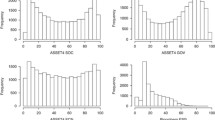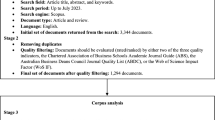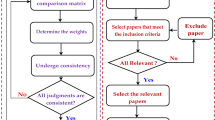Abstract
Conventional data envelopment analysis (DEA) assists decision makers in distinguishing between efficient and inefficient decision making units (DMUs) in a homogeneous group. Standard DEA models can not provide more information about efficient units. Super-efficiency DEA models can be used in ranking the performance of efficient DMUs and overcome this obstacle. Because of the possible infeasibility, the use of super efficiency models has been restricted. This research proposes a methodology to determine a distance-based measure of super-efficiency. The proposed methodology overcomes the infeasibility problem of the existing ranking methodologies. The applicability of the proposed model is illustrated in the context of the analysis of gas companies’ performance.
Similar content being viewed by others
References
Adler N., Friedman L., Sinuany-Stern Z.: Review of ranking methods in DEA context. Eur. J. Oper. Res. 140, 249–265 (2002)
Andersen P., Petersen N.C.: A procedure for ranking efficient units in data envelopment analysis. Manag. Sci. 39, 1261–1264 (1993)
Banker R.D., Chang H.: The super efficiency procedure for outlier identification, not for ranking efficient units. Eur. J. Oper. Res. 175, 1311–1320 (2006)
Banker R.D., Das S., Datar S.M.: Analysis of cost variances for management control in hospitals. Res. Gov. Nonprofit Account. 5, 268–291 (1989)
Bernroider E., Stix V.: A method using weight restrictions in data envelopment analysis for ranking and validity issues in decision making. Comput. Oper. Res. 34, 2637–2647 (2007)
Bogetoft P., Hougaard J.L.: Super efficiency evaluations based on potential slack. Eur. J. Oper. Res. 152, 14–21 (2004)
Charnes A., Cooper W.W.: Programming with linear fractional functions. Nav. Res. Logist. Q. 9, 181–186 (1962)
Charnes A., Cooper W.W., Rhodes E.: Measuring the efficiency of decision making units. Eur. J. Oper. Res. 2, 429–444 (1978)
Chen Y.: Ranking efficient units in DEA. OMEGA 32, 213–219 (2004)
Chen Y.: Measuring super-efficiency in DEA in the presence of infeasibility. Eur. J. Oper. Res. 161, 545–551 (2005)
Doyle J.R., Green R.H.: Efficiency and cross-efficiency in DEA: datives, meanings and uses. J. Oper. Res. Soc. 45, 567–578 (1994)
Du J., Liang L., Yang F., Bi G., Yu X.: A new DEA-based method for fully ranking all decision-making units. Expert Syst. 27, 363–373 (2010)
Engau A.: Variable preference modeling with ideal-symmetric convex cones. J. Global Optim. 42(2), 295–311 (2008)
Erbetta F., Rappouli L.: Optimal scale in the Italian gas distribution industry using DEA. OMEGA 36, 325–336 (2008)
Ganley J.A., Cubbin S.A.: Public Sector Efficiency Measurement: Applications of DEA. North-Holland, Amsterdam (1992)
Hawdon D.: Efficiency, performance and regulation of the international gas industry: a bootstrap DEA approach. Energy Policy 31, 1167–1178 (2003)
Jahanshahloo G., Junior H.V., Lotfi F.H., Akbarian D.: A new DEA ranking system based on changing the reference set. Eur. J. Oper. Res. 181, 331–337 (2007)
Klamroth K., Jørgen T.: Constrained optimization using multiple objective programming. J. Global Optim. 37(3), 325–355 (2008)
Li S., Jahanshahloo G., Khodabakhshi M.: A super-efficiency model for ranking efficient units in data envelopment analysis. Eur. J. Oper. Res. 184, 638–648 (2007)
Lins M.E., Gomes E.G., Soares de Mello J.C., Soares de Mello A.R.: Olympic ranking based on a zero sum gains DEA model. Eur. J. Oper. Res. 148, 312–322 (2003)
Liu F., Peng H.: Ranking of units on the DEA frontier with common weights. Comput. oper. Res. 35, 1624–1637 (2008)
Nahra T.A., Mendez D., Alexander J.A.: Employing super-efficiency analysis as an alternative to DEA: an application in outpatient substance abuse treatment. Eur. J. Oper. Res. 196, 1097–1106 (2009)
Roll Y., Golany B.: Alternate method of treating factor weights in DEA. OMEGA 21, 99–109 (1993)
Samoilenko S., Osei-Bryson K.: Increasing the discriminatory power of DEA in the presence of the sample heterogeneity with cluster analysis and decision trees. Expert Syst. Appl. 34, 1568–1581 (2008)
Seiford L.M., Zhu J.: Infeasibility of super-efficiency data envelopment analysis models. INFOR 37, 174–187 (1999)
Sengupta J.K.: Tests of efficiency in data envelopment analysis. Comput. Oper. Res. 17, 123–132 (1990)
Sexton T.R., Silkman R.H., Hogan A.J.: Data Envelopment Analysis: Critique and Extensions, pp. 73–105. Jossey-Bass, San Francisco, CA (1986)
Tone K.: A slack-based measure of super-efficiency in DEA. Eur. J. Oper. Res. 143, 32–41 (2002)
Yang F., Liang L., Bi G., Ling L.: Ranking all decision making units based on their elementary differences. J. Syst. Eng. Electron. 20, 732–740 (2009)
Author information
Authors and Affiliations
Corresponding author
Rights and permissions
About this article
Cite this article
Amirteimoori, A., Kordrostami, S. A distance-based measure of super efficiency in data envelopment analysis: an application to gas companies. J Glob Optim 54, 117–128 (2012). https://doi.org/10.1007/s10898-011-9745-7
Received:
Accepted:
Published:
Issue Date:
DOI: https://doi.org/10.1007/s10898-011-9745-7




